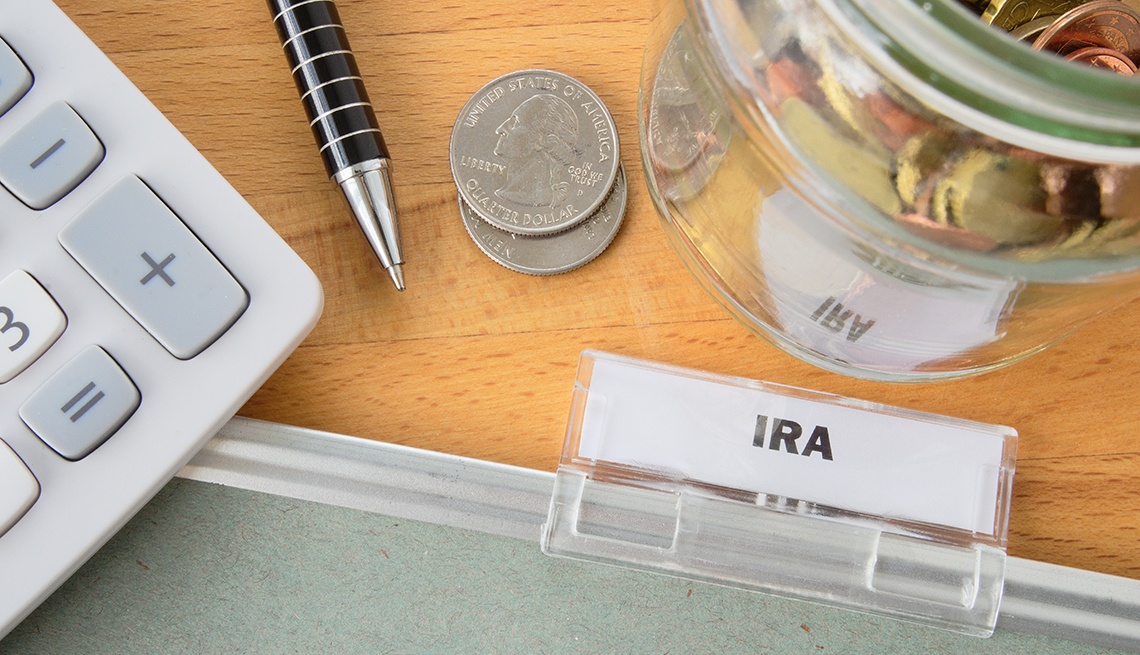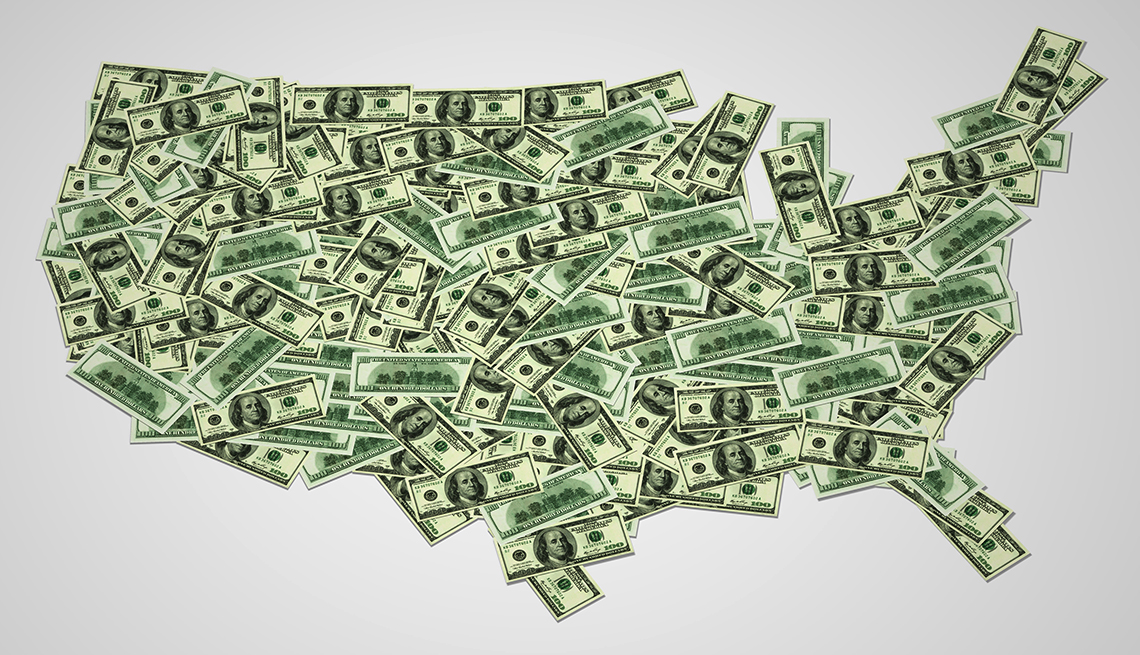Estate or inheritance taxes: Illinois has an estate tax. It applies to estates worth more than $4 million. The estate tax rates range from as little as 0.8 percent to as high as 16 percent.
Iowa
Income taxes: Like Illinois, Iowa doesn’t tax IRA withdrawals, 401(k) plan distributions or pension payments. But if you had other types of income in 2024, you might have to pay Iowa income tax at a 4.4 percent, 4.82 percent or 5.7 percent marginal rate, depending on your state taxable income. (Iowa will have a flat 3.8 percent rate starting in 2025.)
There are some income tax benefits for Iowa taxpayers who are at least 65 years old. For instance, they can claim a larger personal credit, and it’s easier for them to qualify for the low-income exemption from tax. They might also qualify for a special tax deduction for health and dental insurance premiums.
Sales taxes: Iowa’s sales tax is reasonable. The state imposes a 6 percent tax, while most local governments add their own 1 percent tax. The average combined state and local rate is 6.94 percent. Out of all 50 states, that’s the 29th-highest rate.
Property taxes: Iowa’s average property tax rate is on the high end. For 2023, it stood at 1.43 percent of a home’s assessed value, which was the 10th-highest rate for the year.
Low-income homeowners and renters who are 65 or older may qualify for a special property tax credit or rent relief (income requirements are easier to satisfy if you’re at least 70 years old). Homeowners who are 65 or older may also be eligible for an exemption that reduces the taxable value of their home by $6,500.
Estate or inheritance taxes: Iowa doesn’t impose any state-level estate or inheritance taxes.
Mississippi
Income taxes: Mississippi is another state where basically all common forms of retirement income are tax-free. Taxpayers 65 and older also get an additional personal exemption.
For the 2024 tax year, the income tax rate is 4.7 percent. That rate drops to 4.4 percent for 2025, and it’s scheduled to fall to 4 percent in 2026.
Sales taxes: Mississippi’s sales tax rates are about average when compared with other states. The state imposes a 7 percent tax, and local add-ons top out at only 1 percent. The average combined rate in the state is 7.06 percent, the 22nd-highest in the nation.
On a sour note: Mississippi’s 7 percent sales tax applies to groceries.
Property taxes: Mississippi property taxes are on the low end. The average property tax rate was only 0.74 percent of a home’s assessed value for 2023, the 18th-lowest rate in the U.S. that year.
Homeowners age 65 or older may qualify for a special property tax exemption for the first $7,500 of their home’s value.
Estate or inheritance taxes: There are no state-level estate or inheritance taxes in Mississippi.
Nevada
Income taxes: Nevada is another state that doesn’t impose an income tax, meaning all retirement income and other types of income are tax-free.
Sales taxes: The lack of an income tax is counterbalanced by fairly high sales taxes in Nevada. There’s a 6.85 percent state-level tax, and local taxes can be as much as 1.53 percent. The average combined state and local sales tax rate in Nevada is 8.24 percent, the 13th-highest combined rate in the nation.
Property taxes: Nevada has one of the lowest property tax rates in the country. For 2023, the average rate was only 0.49 percent of a home’s assessed value, which was the third-lowest in the U.S. that year. (Note: There are no special property tax breaks for older residents.)
Estate or inheritance taxes: Nevada doesn’t impose estate or inheritance taxes.
New Hampshire
Income taxes: There’s no income tax on common types of retirement income, such as pensions, IRAs, 401(k)s and Social Security benefits, in New Hampshire. For the 2024 tax year, there was a 3 percent tax that only applied to interest and dividends greater than $2,400 ($4,800 for joint tax filers), but that tax goes away in 2025.
Sales taxes: There is no state or local sales tax in New Hampshire.
Property taxes: The average property tax rate in New Hampshire was the fourth-highest in the nation in 2023, at 1.77 percent of a home’s assessed value.
Cities and towns in New Hampshire can provide property tax exemptions to residents 65 years old or older who meet certain income and other requirements. In addition, homeowners 65 and older might be allowed to defer payment of their property taxes if paying the tax would cause an undue hardship or the possible loss of their property.
Estate or inheritance taxes: New Hampshire doesn’t have estate or inheritance taxes.
Pennsylvania
Income taxes: In addition to tax-free pension payments, Pennsylvania doesn’t tax IRA or 401(k) plan distributions in retirement.
Any income that is subject to Pennsylvania’s income tax is taxed at a flat 3.07 percent rate, though local governments can impose their own tax on earned income.
Sales taxes: Pennsylvania’s sales taxes are relatively low. The state tax rate is 6 percent. There’s also a 1 percent local tax in Allegheny County (which includes Pittsburgh), and a 2 percent local tax in Philadelphia. All told, the average combined state and local sales tax rate in Pennsylvania is approximately 6.34 percent, the 17th-lowest in the U.S.
Property taxes: Pennsylvania has a relatively high average property tax rate. For 2023, it was 1.35 percent of a home’s assessed value, the 12th-highest average rate that year.
If you’re 65 or older, you may qualify for a property tax rebate of up to $1,000 if your income is below a certain amount. Residents of Philadelphia, Pittsburgh and Scranton may qualify for an additional rebate of up to $500.
Older Pennsylvanians may also qualify for other local property tax breaks. For instance, a property tax freeze that prevents your property tax bill from increasing is available to certain homeowners in Philadelphia; Allegheny County offers a 30 percent property tax discount to qualified residents; and public school districts can provide property tax credits in exchange for volunteer service.
Estate or inheritance taxes: Pennsylvania has an inheritance tax of 4.5 percent, 12 percent or 15 percent, depending on who is inheriting property. However, there is no inheritance tax for property owned jointly between spouses, property inherited by a decedent’s surviving spouse or property inherited by a parent from a child aged 21 or younger who died. Other exemptions may also apply.
South Dakota
Income taxes: South Dakota has no income tax at all, so there’s no tax on pension income.
Sales taxes: The state’s sales tax rates are on the low side (though the state does tax groceries). South Dakota’s sales tax rate is only 4.2 percent, but localities can add up to 4.5 percent of additional sales taxes. The average combined state and local sales tax rate in South Dakota is around 6.11 percent, the 14th-lowest in the nation.
Property taxes: South Dakota property taxes are a bit high compared to other states. The average property tax rate was 1.09 percent of a home’s assessed value in 2023, the 19th-highest rate that year.
Older residents may qualify for certain property tax relief programs, such as a property tax reduction, refund, freeze or deferral. In most cases, you must be at least 65 years old (70 or older for the deferral if you are selling your home) and have income below a certain amount, among other requirements, to qualify.
Estate or inheritance taxes: South Dakota has no state-level estate or inheritance taxes.
Tennessee
Income taxes: Add Tennessee to the list of states with no income tax — and, therefore, no tax on retirement income.
Sales taxes: Tennessee has the second-highest average combined state and local sales tax rate in the country, clocking in at around 9.56 percent. It’s the result of a 7 percent state-wide tax, plus local sales taxes of up to 2.75 percent.
Groceries are generally subject to sales tax in Tennessee, too, at a rate of 4 percent (plus any local taxes).
Property taxes: While sales taxes are high, property taxes in Tennessee are fairly low. The average property tax rate in 2023 was 0.55 percent of a home’s assessed value, tied with Delaware for the 10th-lowest average rate that year.
If you’re a homeowner in Tennessee who’s 65 or older, you might qualify for one or more property tax relief programs if your income is below a certain threshold. You could get a property tax reimbursement check or have your taxes “frozen” (so they don’t increase); you might also be able to have your tax payments deferred if you live in Nashville.
Estate or inheritance taxes: Tennessee has no estate or inheritance taxes.
Texas
Income taxes: There’s no state income tax in Texas, so all income — including retirement income — is tax-free.
Sales taxes: Texas’ sales taxes are on the high side, starting with a 6.25 percent state rate. Local governments can then add up to 2 percent more. As a result, the average combined state and local tax rate in Texas is about 8.2 percent, the 14th-highest combined rate in the U.S.
Property taxes: You’ll pay more property tax if you own a home in Texas than you would in most other states. The average property tax rate in the state was 1.58 percent of a home’s assessed value in 2023, the seventh-highest rate in the U.S. that year.
Adults 65 or older may be eligible for some property tax breaks. For example, there’s a special $10,000 exemption from school district taxes, while other local governments offer a similar exemption of $3,000 or more. Disabled veterans who are 65 or older may qualify for up to $12,000 in exemptions. Property tax freeze and deferral programs are also available.
Estate or inheritance taxes: Texas does not impose estate or inheritance taxes.
Washington
Income taxes: While there’s no broad-based income tax in Washington — so retirement income is tax-free — there is a 7 percent tax on long-term capital gains (such as on the sale of capital assets held for more than one year). However, there are several exemptions and deductions, so not everyone with long-term capital gain has to pay the tax.
Sales taxes: Sales taxes are high in Washington. The state rate is 6.5 percent, while local governments can add up to 4.1 percent on top of the state tax. The state’s average combined state and local sales tax rate is the fourth-highest in the nation at around 9.43 percent.
Property taxes: Property taxes in Washington are middle-of-the-road. The average property tax rate was 0.84 percent of a home’s assessed value in 2023, for the 24th-highest average rate in the country that year.
There are two property tax breaks available to older residents in Washington. Homeowners 61 or older may qualify for a property tax exemption and freeze. The exemption reduces the resident’s property tax bill, while the freeze prevents the homeowner’s property taxes from going up.
If you’re 60 or older and own a home in Washington, you might qualify for the state’s property tax deferral program.
Estate or inheritance taxes: Washington imposes an estate tax. It kicks in when an estate is worth $2.193 million or more. The tax rate varies from 10 percent to 20 percent.
Wyoming
Income taxes: Wyoming has no income taxes whatsoever, so pension income is tax-free.
Sales taxes: Sales taxes in Wyoming are among the lowest in the country. When you add the state sales tax rate of 4 percent and local taxes of up to 2 percent, you get an average combined rate of only 5.44 percent, the sixth-lowest rate in the nation.
Property taxes: Wyoming residents benefit from the state’s low property taxes, too. In 2023, the state had the 12th-lowest average property tax rate, at just 0.58 percent of a home’s assessed value.
There are two funded property tax breaks for older homeowners. Homeowners 63 or older may qualify for a tax deferral program in certain locations. In addition, a property tax exemption may be available for residents who have paid property taxes in Wyoming for at least 25 years and who are 65 or older (though the exemption goes away in 2027).
Estate or inheritance taxes: Wyoming doesn’t have estate or inheritance taxes.
Find Your State's Tax Guide
Learn more about your state’s tax policies and tax breaks. Check back for updates and new guides.

























































































More From AARP
6 Tax Breaks If You Have an Adult Dependent
Caring for a parent or other family member could cut your income tax bill
Where Is My 2024 Federal Tax Refund?
The IRS offers an online tool that will help you track your payment
Boost Your Tax Return With the Earned Income Tax Credit
You can turn a tax bill into a tax refundRecommended for You